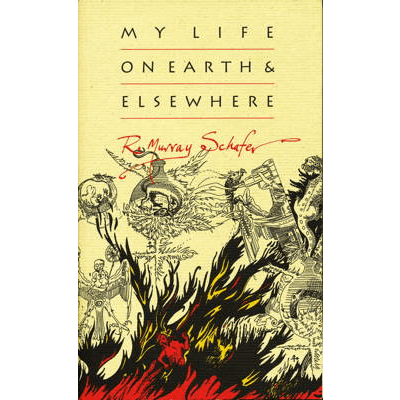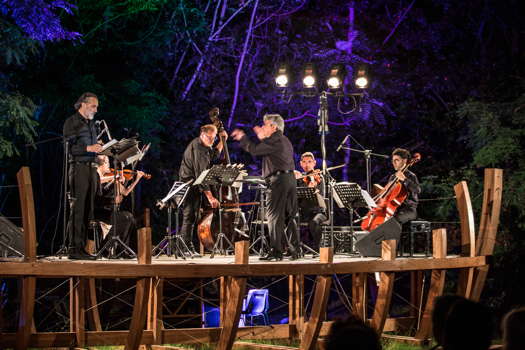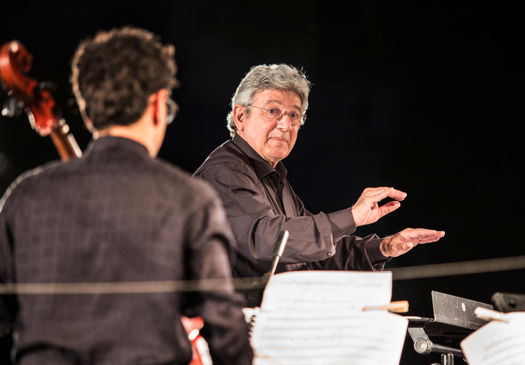 SPONSORED: So Much, for So Many. R Murray Schafer's 'My Life on Earth and Elsewhere', read by A P Virag.
SPONSORED: So Much, for So Many. R Murray Schafer's 'My Life on Earth and Elsewhere', read by A P Virag.
All sponsored features >>
- Boris Christoff
- Jenufa
- EUCO
- UK
- Alexander Binns
- Paul Provost
- Muriel Oberhofer
- Juliana Niu: The Last Night
 DISCUSSION: What is a work? John Dante Prevedini leads a discussion about The performing artist as co-creator, including contributions from Halida Dinova, Yekaterina Lebedeva, Béla Hartmann, David Arditti and Stephen Francis Vasta.
DISCUSSION: What is a work? John Dante Prevedini leads a discussion about The performing artist as co-creator, including contributions from Halida Dinova, Yekaterina Lebedeva, Béla Hartmann, David Arditti and Stephen Francis Vasta.
In a Pleasure Garden
Music by Michele Dall'Ongaro and Verdi
in a chamber music format,
heard by GIUSEPPE PENNISI
Each summer, Accademia Filarmonica Romana moves its musical activities from theaters and concert halls to its headquarters: a Renaissance villa in the heart of Rome, with lush gardens to remind one of Handel's Alcina. Among trees, flowers and tropical plants, there are two small venues for music: one is a real small auditorium (similar to that which Benjamin Britten and Peter Pears had built next to The Red House in Aldeburgh, Suffolk, UK), and the other is outdoors, fruit of the imagination of stage director Denis Krief. There is a small festival with two evening concerts every night, one at 8pm and one at 9.45pm, with the possibility of a snack, prepared and served by experienced Syrians.

A scene from the outdoor concert on 3 July 2019 in Rome. Photo © 2019 Max Pucciariello
The place becomes a veritable garden of delight. This year, the festival, titled Awe, took place from 26 June until 6 July. It included classical, contemporary, jazz and ethnic music. In collaboration with foreign institutes of culture present in Rome, it offered a panorama of recent musical developments in Korea, Iran, Japan, Ireland, Colombia, Bulgaria and the United States. Like every year, particular attention was given to the music of the twentieth century and to living composers.
In this context, the 3 July 2019 concert was particularly significant; it was dedicated largely to music by Michele Dall'Ongaro, the composer and music organizer now at the helm of the Accademia Nazionale di Santa Cecilia, one of the most important Italian musical institutions.
A little introduction is in order. In 2001, on the one hundredth anniversary of Giuseppe Verdi's death, at the suggestion of composer Giorgio Battistelli, then artistic director of the Aquila Concert Society Baratteli, fourteen musicians produced 'new readings' of Verdi operas in contemporary musical language through melologues where the narrator was the actor Vittorio Sermonti. This was a method of celebrating Verdi in small towns not able to prepare (or import from larger theaters) works by the composer, and especially for radio broadcasting. A real kaleidoscope emerged: Gilda, mia Gilda (per non dire Rigoletto) by Michele Dall'Ongaro is one of the jewels.
A melologue made up the second part of the evening. It requires a small ensemble (Quartet Henao) and a double bass (Antonio Sciancalepore). The ensemble was conducted by Erasmo Gaudiomonte. The actor was Alfonso Valdez. Quartet Henao - William Chiquito, Soyean Kim, Stefano Trevisan and James Menna - are all members of the Orchestra dell'Accademia Nazionale di Santa Cecilia.
The melologue 'tells', in fifty minutes, the story of Verdi's Rigoletto, focusing heavily on the first part of Act I of the opera where the ribald and corrupt atmosphere of the Court of Mantua is depicted and the dual character of Rigoletto is shown. The musical writing is contemporary but full of quotes from and echoes of Verdi. While respectful of Verdi's composition, the musical part has ironic overtones; for example, the libretto by Francesco Maria Piave is 'narrated' through today's eyes. Dall'Ongaro gives us contemporary Verdi in a chamber music format.

Erasmo Gaudiomonte conducting the ensemble on 3 July 2019 in Rome. Photo © 2019 Max Pucciariello
The evening started with the single movement String Quartet No 5 by Dall'Ongaro. Verdi's music is echoed especially in the rapid initial attack and in the delicate conclusion. There's violence, almost, in the attack, before the music becomes increasingly more tender.
A rare chamber music work by Verdi followed: the 1873 Quartet in E minor, written at almost the same time as Aida and clearly expressing Verdi's intention to define a new and different type of chamber music, classical in form and typically Italian in style, far from any German imitation. Particularly significant, in this regard, was the decision to end the composition with a fugue. This was the part Verdi considered most important. He even dictated tips. The fugue is compelling, deep and gentle at the same time. The second violin is called to play pianissimo, loose and lightweight. Inevitably one thinks of the magnificent Fugato that concludes Falstaff, where 'everything in the world is a joke' is written in the libretto - polyphony as irony. Twenty years before his last opera, Verdi had already found the way.
Copyright © 15 July 2019
Giuseppe Pennisi,
Rome, Italy



